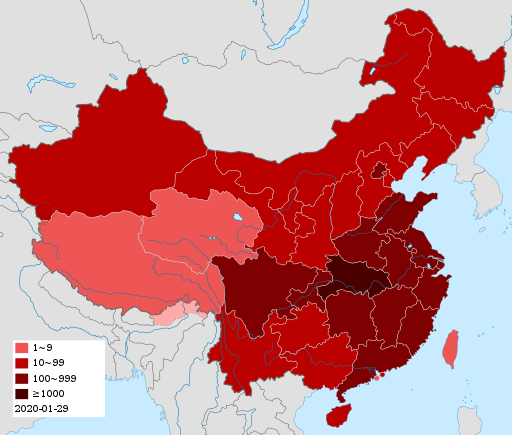The outbreak of Coronavirus Disease (COVID-19) which originated in Wuhan, China has been declared as a Public Health Emergency of International Concern (PHEIC) by the World Health Organization (WHO). At the time of writing the article , there w approximately 71,811 confirmed cases, and 1,775 deaths globally due to this deadly virus (1).
The current outbreak, and its infectiousness, has created flutters of apprehension throughout the world. Like the previous pandemic threats, it stands to reason that there might be adverse impacts on the mental health of the affected people, their family members, community members, and the health professionals treating people infected with the virus.

The pattern of emergence of this COVID-19 has some similarities with the previous outbreak of severe acute respiratory syndrome (SARS), which was started from the Guangdong province of southern China in 2002, eventually affecting 26 countries and resulting in about 8,000 cases. Psychiatric morbidities, including anxiety, depression, panic attacks, psychotic symptoms, delirium, were reported after the initial outbreak of SARS (2).
Coronavirus affected patients may experience severe distress, and symptoms of anxiety, depression, and delirium have been commonly seen in the infected persons (3). In addition, quarantining protocols have been applied to reduce transmission of coronavirus which may lead to stigma and community isolation. Specialist psychological consultations may be crucial for the mental well-being of patients segregated in the isolation wards (4, 5).
Social media, and its instant connectivity, has played an aggravating role in inducing mass panic, and misinformation. The effects of the outbreak have also been profoundly felt in the financial markets across Asia. The Chinese stock market fell sharply after the outbreak , and Chinese authorities suspended trading on the Shanghai and Shenzhen stock exchanges. Furthermore, the world’s economy is tightly interlinked with China. Even the Australian share market is down by abour 1.5% in the aftermath of the outbreak. Disruptions in business, closure of markets, schools, and community services might carry longer-term psychosocial effects (6)(7). Reports of anti-Chinese racism, and attacking the country’s cultural mores have been noted in several countries (8).
People with possible COVID-19 may also experience distress, anxiety depression and stigma. Additionally, the implication of strict quarantine and isolation protocols to reduce transmissions of coronavirus may lead to social stigma and community isolation for a suspected person, which in turn, may aggravate psychological disorders of an individual. To address these issues, taking care of the mental health training of health workers is also an essential part of the COVID-19 outbreak. Strategies to engage and encourage peer-support networks for COVID-19 survivors and their families might also be considered. Focussing on mental health form the onset will help foster a more comprehensive and sustainable response to COVID-19.
References
- Johns Hopkins CSSE. Coronavirus COVID-19 Global Cases. https://gisanddata.maps.arcgis.com/apps/opsdashboard/index.html#/bda7594740fd40299423467b48e9ecf6 [Accessed on Feb 17, 2020]
- Maunder R, Hunter J, Vincent L, Bennett J, Peladeau N, Leszcz M, et al. The immediate psychological and occupational impact of the 2003 SARS outbreak in a teaching hospital. CMAJ. 2003;168(10):1245-51.
- Xiang Y-T, Yang Y, Li W, Zhang L, Zhang Q, Cheung T, et al. Timely mental health care for the 2019 novel coronavirus outbreak is urgently needed. The Lancet Psychiatry. 2020. S2215-0366(20)30046-8
- Mushtaq R, Shoib S, Shah T, Mushtaq S. Relationship between loneliness, psychiatric disorders and physical health? A review on the psychological aspects of loneliness. Journal of Clinical & Diagnostic Research. 2014;8(9):WE01.
- Coughlin SS. Anxiety and depression: linkages with viral diseases. Journal of Public Health Reviews. 2012;34(2):7.
- CCN: Market News. China Frantically Shuts Down Stock Market to Prevent Coronavirus Selloff. https://www.ccn.com/china-frantically-shuts-down-stock-market-to-prevent-coronavirus-selloff/. [Accessed on Feb 17, 2020]
- Van Bortel T, Basnayake A, Wurie F, Jambai M, Koroma AS, Muana AT, et al. Psychosocial effects of an Ebola outbreak at individual, community and international levels. Bulletin of the World Health Organization. 2016;94(3):210.
- Market Watch. ‘No Chinese allowed’: Racism and fear are now spreading along with the coronavirus. https://wwwmarketwatchcom/story/no-chinese-allowed-racism-and-fear-are-now-spreading-along-with-the-coronavirus-2020-01-29. [Accessed on Feb 17, 2020]
About the Authors:
Dr Zubair Ahmed Ratan, MBBS, is a PhD student in the School of Health and Society, University of Wollongong, Australia. He works as an assistant professor in Khulna University of Engineering and Technology, Bangladesh. He is currently working on smartphone addiction projects.
Dr Hassan Hosseinzadeh, PhD, is a Senior Lecturer and Academic Program Director of Master of Public Health in the School of Health and Society, University of Wollongong, New South Wales, Australia. He has special interests in health behaviour change, chronic disease, sexual health including HIV/AIDS, health literacy, and primary care.
Dr. Nusrta Jahan Runa, MBBS, is working as a medical officer in Rajbari Sadar Hospital, Rajbari, Bangladesh. Her research interests include population health and primary health care in low and middle-income countries.
Dr Sojib Bin Zaman, MBBS, MSc. is a PhD student at the Department of Medicine, School of Clinical Sciences at Monash Health, Monash University, Melbourne, Australia. His research interest includes communicable and non-communicable diseases, maternal and child health, and health systems research.
Professor Jae Youl Cho, PhD, works at the Department of Integrative Biotechnology, Sungkyunkwan University. His research areas are inflammatory and cancer signaling and development of anti-inflammatory and anti-cancer remedy from natural resources.
Competing interest
We have read and understood the BMJ Group policy on declaration of interests and we have no relevant conflicts of interests to declare.